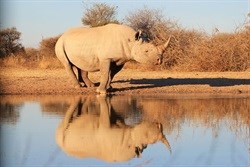
Top stories


ESG & Sustainability#BudgetSpeech2026: SRD grant unchanged, other Sassa social grants see hike
8 hours




More news











ESG & Sustainability
South Africa’s carbon tax should stay: climate scientists explain why










Bell, director of the International Fund for Animal Welfare (IFAW) Southern Africa, says the government had been actively lobbying to gain support for legalised trade in rhino horn. "IFAW believes the only certainty of the impact of legalising trade in rhino horn in an attempt to save them from poachers, is uncertainty. It is far too risky an experiment to consider whispering about in government corridors. Only decisions made on sound science should be discussed," says Bell.
Conservationists from around the world gathered in Pretoria at the International Conference to Assess the Risk of Rhino Horn Trade.
Bell says a review commissioned by IFAW on the economics of trade in endangered species, and rhino horn in particular, found there to be real risk that regulated trade could drive an increase in poaching. The outcomes of the review by Australian based Economists at Large, are contained in Horn of Contention: A Review of Literature on the Economics of Trade in Rhino Horn.
"In the face of this uncertainty, just how much risk should be tolerated? The questions are not solely economic. There are political and ethical considerations and questions of international credibility. By 14 March this year 172 rhinos had been poached in South Africa, and last year the total was 1,004.
"Given the international attention that illegal wildlife trade, rhino horn and elephant ivory in particular, are receiving there is little chance of South Africa's gaining permission to sell horn from the next meeting of CITES in 2016," says Bell.
"Following through on such a proposal would be politically naïve and would fly in the face of unprecedented international efforts to clamp down on illicit wildlife trade and poaching. It will not only be bad for rhinos but bad for international relations too.
"IFAW believes South Africa should stand together with the international community in putting pressure on countries like Vietnam and China, which are consumers of rhino horn, elephant ivory and other wildlife, to do everything possible to eliminate demand. By doing so, South Africa would show the world that it values its rhino on ecological, symbolistic and moral grounds, and not utilitarian ones," Bell concludes.